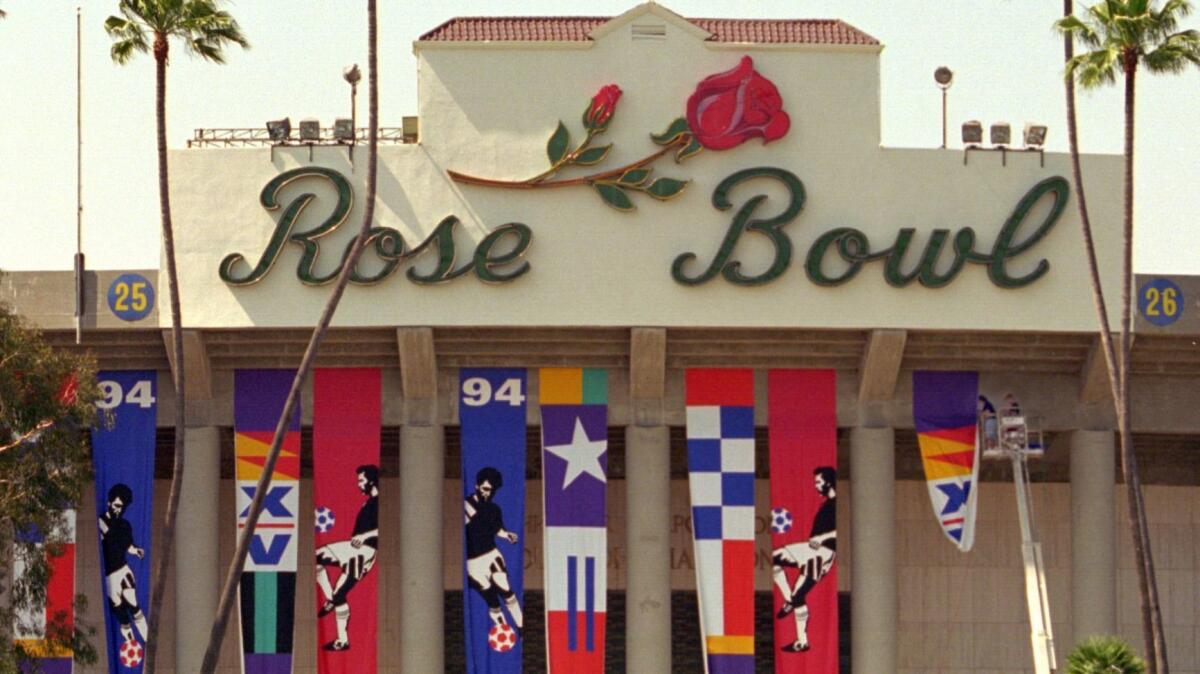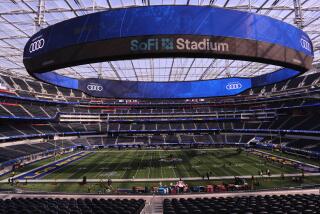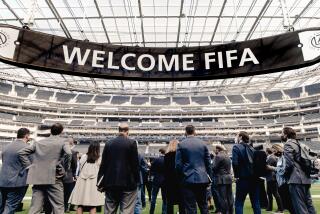Coliseum, Rose Bowl and Inglewood NFL stadium apply to stage World Cup games

Three Southern California stadiums have submitted paperwork to stage World Cup games in 2026 should the united bid of the U.S., Mexico and Canada to host the tournament win approval from FIFA.
The Coliseum, the new NFL stadium set at Hollywood Park and Pasadena’s Rose Bowl, site of the 1994 World Cup final, are among the venues that have applied to the United Bid Committee, which will pare that to a shortlist of prospect host cities later this month. Forty other cities in 25 U.S. states and the District of Columbia, three Mexican states and five Canadian provinces also have expressed interest in staging World Cup games. Twenty to 25 cities will be included in the final bid submitted to FIFA.
Other U.S. stadiums that have submitted bids include the new Mercedes-Benz Stadium in Atlanta, AT&T Stadium in Arlington, Texas, Legion Field in Birmingham, Ala., Chicago’s Soldier Field, the Raiders’ proposed stadium in Las Vegas, Levi’s Stadium in Santa Clara and the University of Phoenix Stadium in Glendale, Ariz.
Six Canadian stadiums and three in Mexico — including Mexico City’s Estadio Azteca, the first stadium to host two World Cup finals — also are being considered. Among the options are Olympic Stadium in Montreal, Vancouver’s BC Place and Liga MX facilities in Guadalajara and Monterrey.
“The host cities will help define the United Bid. Each will offer the best facilities and infrastructure to stage the world’s biggest single-event sporting competition, the FIFA World Cup, and together they will play a key role in the development of the sport in North America,” United Bid Committee executive director John Kristick said in a statement. “We’re thrilled with the submissions that we have received, especially each city’s commitment to innovation and sustainability, and we look forward to bringing the best group of candidate host cities together for our official United Bid.”
The 41 cities represent diverse geographical regions across the three countries and a wide array of facilities, including stadiums for soccer and American football as well as domed and retractable-roof facilities.
All stadiums are required to have at least 40,000 seats for group-stage matches and a capacity of at least 80,000 to be considered for the opening match and the final.
The submitted bids provide information about each city’s experience hosting major sporting and cultural events, potential venues, transportation infrastructure, available accommodations, environmental-protection initiatives and more.
Each city also must propose international-level training sites and locations for team base camps as well as hotels for teams, staff and VIPs.
The three-country united bid will be competing against a bid from Morocco to stage the 2026 World Cup. FIFA is expected to choose between the two proposals at its congress next June. The 2026 World Cup will be the event’s largest, with 48 participating.
The United Bid sites are:
U.S.
(city, stadium, capacity)
- Atlanta, Mercedes-Benz Stadium, 75,000
- Baltimore, M&T Bank Stadium, 71,008
- Birmingham, Ala., Legion Field, 71,594
- Boston, Gillette Stadium, 65,892
- Charlotte, N.C., Bank of America Stadium, 75,400
- Chicago, Soldier Field, 61,500
- Cincinnati, Paul Brown Stadium, 65,515
- Cleveland, FirstEnergy Stadium, 68,710
- Dallas, Cotton Bowl, 92,100; AT&T Stadium, 105,000
- Denver, Sports Authority Field, 76,125
- Detroit, Ford Field, 65,000
- Houston, NRG Stadium, 71,500
- Indianapolis, Lucas Oil Stadium, 65,700
- Jacksonville, Fla., EverBank Field, 64,000
- Kansas City, Mo., Arrowhead Stadium, 76,416
- Las Vegas, Raiders Stadium, 72,000
- Los Angeles, Coliseum, 78,500; L.A. Stadium/Hollywood Park, TBD; Rose Bowl, 87,527
- Miami, Hard Rock Stadium, 65,767
- Minneapolis, U.S. Bank Stadium, 63,000
- Nashville, Nissan Stadium, 69,143
- New Orleans, Superdome, 72,000
- New York/New Jersey, MetLife Stadium, 82,500
- Orlando, Fla., Camping World Stadium, 65,000
- Philadelphia, Lincoln Financial Field, 69,328
- Pittsburgh, Heinz Field, 68,400
- Phoenix, University of Phoenix Stadium, 73,000
- Salt Lake City, Rice-Eccles Stadium, 45,807
- San Antonio, Alamodome, 72,000
- San Francisco/San Jose, Levi’s Stadium, 72,000
- Seattle, CenturyLink Field, 69,000
- Tampa, Fla., Raymond James Stadium, 73,309
- Washington, D.C., FedEx Field, 82,000
Canada
- Edmonton, Commonwealth Stadium, 56,335
- Montreal, Olympic Stadium, 61,004
- Ottawa, TD Place Stadium, 24,341
- Regina, Mosaic Stadium, 30,048
- Toronto, BMO Field, 28,026
- Vancouver, BC Place, 55,165
Mexico
- Guadalajara, Estadio Chivas, 45,364
- Mexico City, Estadio Azteca, 87,000
- Monterrey, Estadio BBVA Bancomer, 52,237
Follow Kevin Baxter on Twitter @kbaxter11







